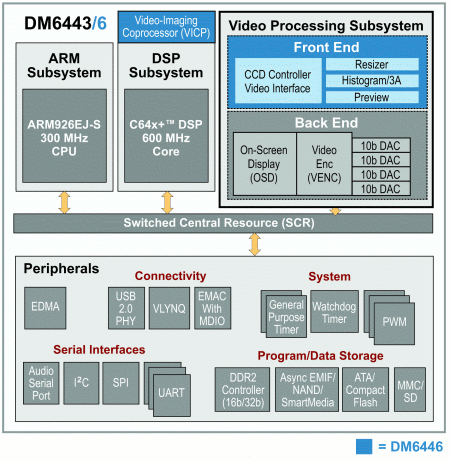Video coprocessor library released
Dec 8, 2008 — by Eric Brown — from the LinuxDevices Archive — 4 viewsTexas Instruments (TI) released a library aimed at making it easier for developers to exploit its VICP (video/imaging coprocessor) hardware accelerator. The free library lets C programs control the VICP, which offloads media processing tasks from the DSP (digital signal processor) core of certain Linux-compatible DaVinci system-on-chips (SoCs).
The VICP library is a collection of loosely coupled accelerators, or in the words of TI, “highly tuned software algorithms” that support the VICP hardware accelerator. The latter acts as a parallel MAC engine on some DaVinci processors, and is touted as improving DSP performance when used with codecs available from TI. Perched atop the architecture diagram below, the VICP is attached to the C64x+ DSP core within TI's Linux-ready TMS320DM64xx SoCs, including the DM6446, DM6441, DM647, and DM648.

DaVinci DM644x architecture diagram
The C-based VICP library eases the programming of the VICP accelerators, says TI. The library supports matrix and array operations, DSP operations, and digital image and video processing functions, says TI. It offers the capability to execute the APIs in either synchronous or asynchronous mode, as well as internally interface with the system DMA manager, thereby reducing system integration complexity, claims the company. The library is also said to handle on-chip cache and external memory synchronization.
 The DM6446-based Neuros OSD 2.0 set-top box (Click for details) |
TI's recent DM6467 offers an upgraded version of the VICP called the HD video/imaging coprocessor (HD-VICP). The HD-VICP is said to offer 3GHz of DSP processing power using dedicated 1080i H.264 accelerators. The HD-VICP can speed tasks like motion estimation/compensation, context adaptive coding/decoding, and loop filtering, says TI.
Availability
The VICP Signal Processing Library is available for free download (Windows OS host only) at this TI site (free registration required). TI did not reply by press time to questions about commercial licensing for the library.
Thanks to Joe Born, Neuros CEO, for alerting us to the release. Born, whose company uses TI's DM6446 in its Linux-ready “Open Source Device 2.0” set-top box, was excited about the release, as indicated in this blog entry.
This article was originally published on LinuxDevices.com and has been donated to the open source community by QuinStreet Inc. Please visit LinuxToday.com for up-to-date news and articles about Linux and open source.